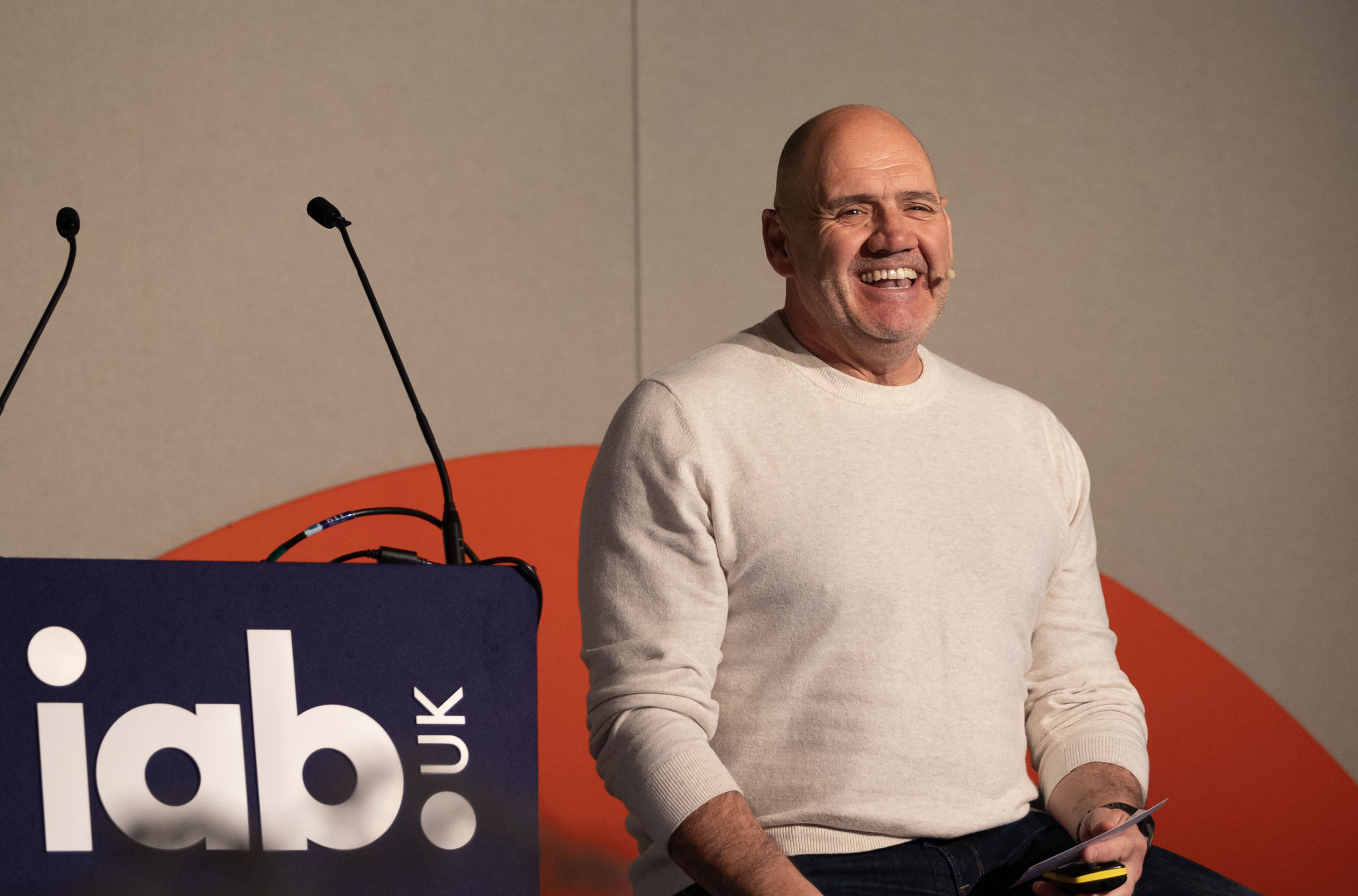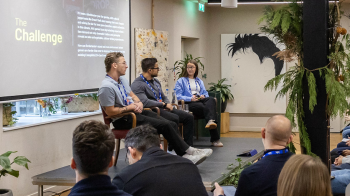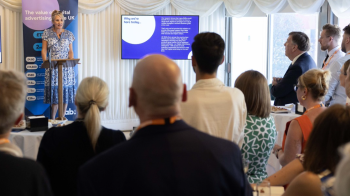Leadership Summit 2025: The highlights
Posted on Thursday 13 March 2025 | IAB UK
From what to do with all the AI, to challenging stereotypes around ADHD, read the highlights from Leadership Summit 2025
Opening Leadership Summit 2025, Jon Mew, CEO of IAB UK, said that relentless change has been a core theme for the event over the years, “but change today is different”. He pointed to global instability, political uncertainty, cultural division, and technological upheaval as forces defining the world. As Jon put it, our industry now sits at the intersection of politics, economics, and culture and “the decisions we make as businesses and leaders matter.” He called on the industry to collaborate and take collective action “to establish best practices, reinforce trust, and advocate for the value of a sustainable, ad-funded ecosystem.” His ask of the room? Engage, debate and challenge. And with that, our annual Leadership Summit got underway.
Day 1: The morning
A critical crossroads
While Enders Analysis is reasonably optimistic about the advertising market, according to its CEO Douglas McCabe, “we have entered a critical crossroads for advertising and media”. From the multiple and complex alternatives to cookies to the need to ditch a brand safety approach that penalises professional journalism, Douglas explained how media and advertising is undergoing an AI-driven transformation that means “collaboration is more important than ever”. According to him, specialism is key. “Media needs to look to the future and the past, to its 19th and 20th Century roots” to embrace the AI unbundling of content, specialise and then re-bundle.
What to do with all this AI?
That was the key question on the table as Dominique Van-Winther - CEO of Final Upgrade AI - took to the stage. Describing herself as both an AI evangelist and maximalist, Dominique believes that artificial intelligence will replace most things that we do, but that “it will work out pretty well”. While there is a big emphasis on how AI is programmed, she explained that “your role as leaders is far more important because it’s about how you bring that tech into the business”. From Claude to Napkin to Gamma, she gave delegates a tour of essential AI tools that can boost teams’ efficiency and revolutionise processes. Her resounding advice: embrace the chaos and don’t feel like you have to know everything. It’s more important to get moving in this space than it is to necessarily know where it will go.
Challenging stereotypes around ADHD
Eva Grimmett, Chief Strategy Officer at PHD, shared her experience of leading with ADHD and challenged established stereotypes about what it ‘looks like’: “You probably picture a hyperactive little boy… you certainly wouldn’t picture a woman, least of all a high achieving woman.” She explained that women are often misdiagnosed with depression or eating disorders, so challenging the stereotypes about who gets ADHD and how it shows up in different people is crucial. “For women, the key thing is that the hyperactivity bit of it is internalised”, she said. Her advice on how to lead with ADHD included working with your own energy (Eva’s peak productivity window is 5am-11am) and making sure to carve out time away from people. When it comes to managing someone who has ADHD, she urged delegates to “be focused on the outcomes and the work they produce, not on presenteeism or the process that they follow”.
Resilience is a choice
“Lack of resilience is a problem”, said Phil Wall, an executive coach and expert in building resilience. The good news? Building reliance is a choice and a skill - and it’s essential for leaders to both succeed and build strong teams. The steps that Phil advised delegates to take include making structured time to restore yourself and your capacity for resilience; finding your safe place and people; and not shying away from struggle which, as he put it, “creates calluses in your mind”. But most importantly, people seeking to build resilience have to “build intimacy with a version of [their] future self” in order to understand the stories we believe are true about ourselves and are going to make true.

Human curiosity is unlimited
People are always searching for answers and meaning, according to Sophie Neary, Managing Director of retail & consumer goods at Google, and search habits are a barometer of the people. While 30% of Google searches are for shopping purposes, 70% are purely to discover new information. When it comes to scale, there were 5 trillion searches on the platform last year, with people in the UK spending a combined 288 years Googling what to wear. Sophie showed how AI is transforming what’s possible when it comes to search-led discovery, creating a less linear, holistic and visual process via tools like Google Lens and ‘circle to search’. With more choice than ever before enabled by the technology, brands are going to have to fight harder to be relevant.
Stay true to your own values
Having joined Snap last year, Bridget Lea - Vice President and General Manager UK - spoke to David Wilding, Chief Strategy Officer at EssenceMediacom, to share her insights into the digital advertising industry. Bridget - who brings a wealth of experience from roles at EE, M&S, Topshop, Sainsbury’s and O2 - explained that she was drawn to Snap as “a challenger brand” and has found there to be a huge amount of collaboration across the wider industry. However, she did challenge delegates to consider whether they know enough about sectors outside of their own. On the subject of leadership specifically, Bridget urged the people in the room to be bold and stay true to their own values to support underrepresented team members who might be feeling vulnerable at the moment.
Day 1: The afternoon
Leading with accessibility
GroupM’s Sandra Arnold shared how she has navigated hearing loss over the past 25 years and the power of leading with accessibility. Once she was honest with herself, her colleagues and her organisation about what she needed in order to succeed in her job - such as having auto-generated captions in meetings - Sandra has witnessed how taking an accessible approach to the work environment has benefited people across her team by giving them permission to be authentic and creating a context where everyone can be themselves. As she put it: “Leading with accessibility teaches you that diversity isn’t a challenge to overcome, it’s an opportunity to grow.” Her advice to the leaders in the room to improve accessibility? Audit your workplace, educate your workforce, and advocate for accessibility at every level of your organisation.
A window on the news
The News Movement’s Rebecca Hutson chaired a fascinating discussion with Bel Trew, International Correspondent at The Independent and Timothy Revell, Executive Editor of New Scientist, about the biggest global stories set to unfold in 2025 - from the continued rise of populism across the world, to who is winning the AI race. Trump’s election was in part down to the “old school democrats being so out of touch with the world… [and] 'otherisation' of people who don’t agree with them”, combined with the core fact that “people can’t pay their grocery bills”, Bel said. However, while populism’s currency of snappy slogans captures voters’ interests, the policies behind them have to actually improve working people’s daily lives. On the subject of AI, Timothy said that the US is currently winning the technology race, but China isn’t far behind. In general, he thinks that - according to Gartner's hype cycle - AI is slightly on the downward trend at the moment as people realise LLMs haven’t yet evolved to excel in every area.
Moving away from last-click
Following the launch of Futurescape - IAB UK’s new study that explores the shifts that will shape our industry in the run up to 2030 and beyond - James Chandler, the IAB’s CSO, chaired a discussion about the decade ahead. Measurement was a key focus, with Meta’s Pete Buckley pointing out that “70% of marketers are still using last click as a way to determine the performance of their digital marketing spend” even though it largely represents non-incremental sales - and it’s because finance teams are asking for because it delivers certainty. As he put it: “If we move away from last-click, it advances the whole media ecosystem.”
However, OMD UK’s Lina Angelides pointed out that short-term metrics are being challenged more and more, with agencies holding a level of responsibility when it comes to what metrics are shared as meaningful with clients. Looking to the near future, the panel discussed what’s keeping them optimistic about 2025, with Initiative’s Sharon Dhillon saying that “it’s more clients talking about brands, not short-termism… and I think AI will help facilitate that”, something that is backed up by the findings of Futurescape.
Unlocking the power of dyslexia
“20% of you in this room are probably dyslexic”, explained Uber Advertising’s Paul Wright, who found out about his own dyslexia as an adult. While he was told that he was “thick” at school for not excelling at traditional academic learning, Paul believes that his dyslexia is “a positive, not a negative thing” helping him to excel when it comes to creativity and big picture thinking. More generally, “40% of entrepreneurs are dyslexic… there’s something behind that”. His focus now is to help educate organisations about how to leverage the unique skills that dyslexic people have and change long-held misconceptions about it.
We need to talk more about money
In conversation with the7stars’ Sabrina Francis, Sophie Pender - Founder & CEO of The 93% Club - shared how she turned her lived experience into a social movement. “What school did you go to?” was a routine question Sophie was asked at Bristol University, explaining that “I suddenly realised that everyone knew each other”. Having attended state school in North London and grown up working class, this ‘social sorting’ strategy was a new world that led to her setting up the 93% Club Facebook page to get in touch with other people from a similar background to her. It was a move that set the course for her career. When it comes to how our industry can improve social mobility, Sophie said that improving visibility and transparency is key: “A lot of people don’t actually know what you guys do, there is a knowledge gap there… working class people aren’t coming in because they don’t know this exists.” Alongside this, we need to talk about money more, especially when it comes to new grad jobs. As Sophie put it: “If you can’t see how much you’re going to be earning, you’re not going to be invested in that.”
Breaking records with SMG
Rounding up day one, Sam Knights - CEO of SMG - drew on his career from P&G to SMG to share advice he’s accrued along the way (with a bit of help from some record breakers, having started out working for Guinness Book of Records). Point number one: stay foolish. “When you do something different and start something new, there will be some people around you that will say ‘you’re stupid, don’t do it’ but listen to those that are around you who support you,” urged Sam. Both measurement and mindset are also key to succeed. “You can’t improve if you’re not measuring, especially if you’re a small business” and “concentrating on your people” is essential to build a culture that thrives.
Day 2
Inspire confidence about change
Day two of Leadership Summit got underway with the Rt Hon Baroness Nicky Morgan - Chair of the Advertising Standards Authority and former Culture Secretary - sharing her unique journey from government policymaking to business leadership. On what makes for an effective leader, Nicky said that “you have to inspire confidence about change… but you also need to think strategically and I think that’s one of the great challenges for leaders in any organisation, to carve out time to do that”. Empathy is also key to strong leadership, particularly today where some people might feel trepidation about the shift towards an increasingly digital world. However, embracing the new is critical. “Being open and being seen as a leader to be open to new technology is incredibly important, but that doesn’t mean being unquestioning about it”, Nicky said, pointing to the potential of AI but also the need to effectively regulate it.
Great companies let young people train them
“Why is it that every generation looks at the generation coming up behind them and says ‘why are they so lazy?’”, asked Ollie Henderson, Founder of Future Work/Life. Across the centuries, the pattern is the same but while “people haven’t changed that much, the world of work is changing fast”. According to Ollie, the misguided assumption that younger generations are lazy is holding us back. With the work from home debate still raging, Gen Z taking a more value-led approach to work, AI threatening to up-end the job market, and our career lifespans lasting longer than ever before, we need to embrace the power of a multi-generational workforce by connecting generations. “You can invite [young people] in.. .this is the single most effective thing that you can do as leaders. Great companies don’t just train young people, they let young people train them,” he explained. A great example? Compare the Market’s long-running meerkat campaign was thought up by someone on work experience. In a nutshell, don’t just assume that “our way is the best way, but be open to learning from generations coming up behind us”.
Sexual harassment isn’t a thing of the past
Pippa Glucklich, CEO of Electric Glue, shared the work that timeTo is doing to expose and tackle the reality of sexual harassment in the advertising industry. “It’s not a thing of the past, it’s widespread and it’s enormously under-reported”, Pippa explained, with timeTo’s research showing that 34% of women and 19% of men having experienced sexual harassment in our industry in some form. Her core message was that leaders don’t just have an ethical responsibility to take action on sexual harassment, they have a legal responsibility to prevent it. As a non-profit, timeTo’s work includes developing a code of conduct that builds on its research to provide guidance on combatting sexual harassment, as well as training to “give you and your teams the forum and the framework to talk about what is a hard thing to talk about it”. She called on delegates to sign up to timeToo and get teams trained and support the initiative by endorsing it: “We have all got the power in this room to end sexual harassment if we can do the right thing… let’s drive change for the better.”
Test & learn, test & scale
“More than ever, I have to constantly think about striking the right balance”, explained Susie Thompson, Coty’s Media & Communications Senior Director, referencing the balance between efficiency and effectiveness, as well as navigating being in constant ‘test and learn’ and also ‘scale’ mentality. In conversation with IAB UK's Roisin Donnelly, Susie said that the ‘test and learn’ approach has allowed the beauty brand to embark on successful creator partnerships by jumping on opportunities and “being totally agile” to tap into trends. Her advice to keep building and enhancing a brand: embrace continued learning. You either “test and fail or test and scale”. On the value of media agencies, she said that the agency role is critical, describing Coty’s media agency as “an extension of our brand”, but also recognising that “you have to challenge your agencies to make sure that they understand your business”.
Leading with the menopause
Blis’ Kelly Jacobson Collins shared her experience of going through the menopause - an experience that results in 80% of women dealing with brain fog and memory loss; 66% experiencing depression; and a 19% having suicidal thoughts. “The one thing that really floored me was brain fog, I couldn’t remember words or names… I thought I had early onset Alzheimer’s”, Kelly said. She believes that people are now talking about the menopause in the workplace more because we have a culture of ‘bringing your whole self to work’, but also because - up until recently - women had often stopped working or been pushed out of the workplace by the time they went through menopause. By putting the right support policies in place now, “women can continue to thrive at work”.
Inspiring disabled & able-bodied people
Leadership Summit 2025 concluded with Nic Hamilton - a rising star in the British Touring Car Championship - sharing his powerful story. Born two months premature, Nic was diagnosed with a form of cerebral palsy as a toddler and his parents were told that it was highly unlikely he would ever walk. He discussed how his parents approach to his disability and decision not to wrap him in cotton wool - while difficult for him to understand at the time - is now something he is extremely grateful for. “It made me super, super independent… [and] taught me to not to be scared of my disability or scared of failure… it builds you as a person.” When he was eight years old, Nic’s mum urged him to be proud of his difference and lean into his uniqueness, and it was as a teenager that he made the decision not to use a wheelchair again.
Today - as a professional racing driver who competes against able-bodied drivers in the British Touring Car Championship - Nic credits his mum in particular as having helped him find the strength to get where he is. As a public speaker, he has also found his purpose: “My purpose is actually being a disabled person… to share my voice and inspire as many people as I can to be whoever they want to be.” His final word to the audience? “If you see my brother Lewis, make sure to say ‘Oh, you’re Lewis, Nic Hamilton’s brother!”
Written by
IAB UK
Related content
AI use case study: Dentsu x Microsoft
Learn moreDebrief 2025: How brands are redefining connection, creativity and commerce
Learn moreDFS follows its “What’s Your Thing?” mantra into the spotlight with October’s Joy of Digital Award
Learn moreIAB UK manifesto for growth in digital advertising
Learn more
Fast forward to 2030 with Futurescape
An in-depth exploration of the attitudes, innovations and media shifts that will shape the years ahead and redefine how we advertise by the turn of the decade



